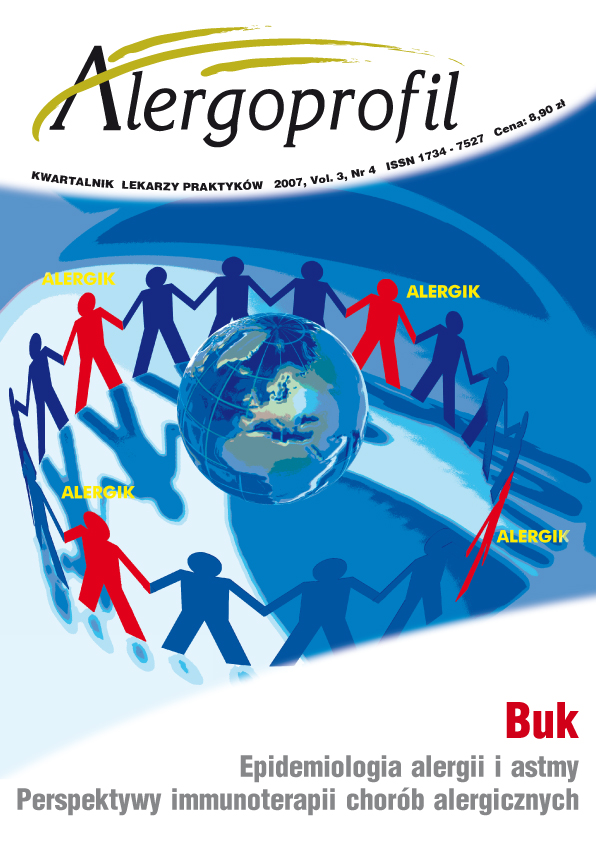The influence of the isotonic solution of sea water (Marimer) application on allergic symptoms and nasal mucosa in allergic rhinitis sufferers sensitised to pollen allergens
Main Article Content
Abstract
The basis of allergic rhinitis treatment is the reduction of the contact of nasal mucosa with allergens. The hypothesis proposed by the authors of this study is that in a group of patients using an isotonic solution of sea water (Marimer, Laboratoires GILBERT, France) in addition to standard treatment with antihistamines and intranasal steroids the symptoms of allergy should be diminished compared to a group of patients treated with antihistamines and intranasal steroids only. The study embraced 106 patients with persistentallergic rhinitis due to house dust mites allergens hipersensitivity. The patients were divided into 3 groups: group I – patients receiving antihistaminics and topical nasal steroids, group II – patients receiving, besides above mentioned drugs, additionally cromoglicans, group III – patients receiving, besides above mentioned drugs, additionally Marimer preparation. The lower incidence of symptoms assessed in the form of symptoms score card and rhinologic examination was recorded in group III – patients receiving the isotonic solution of sea water (Marimer) as pharmacological treatment adjunct. Nasal washing with the isotonic solution of sea water seems to be a valuable supplement of the pharmacological treatment of allergic rhinitis.
Downloads
Article Details
Copyright: © Medical Education sp. z o.o. This is an Open Access article distributed under the terms of the Attribution-NonCommercial 4.0 International (CC BY-NC 4.0). License (https://creativecommons.org/licenses/by-nc/4.0/), allowing third parties to copy and redistribute the material in any medium or format and to remix, transform, and build upon the material, provided the original work is properly cited and states its license.
Address reprint requests to: Medical Education, Marcin Kuźma (marcin.kuzma@mededu.pl)
References
2. Schatz M.: A survey of the burden of allergic rhinitis in the USA. Allergy 2007, 62 (supl.85): 9-16.
3. Valovirta E., Myrseth S.E., Palkonen S.: The voice of the patients: allergic rhinitis is not a trivial disease. Curr. Opin. Allergy Clin. Immunol. 2008 (w druku).
4. Tan R., Spector S.: Pediatric sinusitis. Curr. Allergy Asthma Rep. 2007, 7(6): 421-6.
5. Alergiczny nieżyt nosa i jego wpływ na astmę (Raport ARIA). Medycyna Praktyczna 2002, 7: 1-263.
6. Mullol J., Rieves R.D., Baraniuk J.N., Lundgren J.D., Merida M., Hausfeld J.H.: The effects of neuropeptides on mucous glycoprotein secretion from human nasal mucosa in vitro. Neuropeptides 1992, 21: 231-8.
7. Rapiejko P., Wojdas A., Jurkiewicz D.: The Influenceof the isotonic solution of sea water (Marimer) application on nasal mucosa in allergic rhinitos sufferers. Pol. J. Environ. Studies 2007 (w druku).
8. Ratajczak J., Rapiejko P., Wojdas A., Lipiec A., Jurkiewicz D.: Voice organ dysfunction in patients with allergic rhinitis sensitized to birch. Pol. J. Environ. Studies 2007, 16(1A): 51-54.

